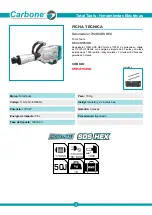
South Bend Tools
For Machines Mfd Since 1/21
Model SB1493
-17-
O P E R A T I O N
Disabling Switch
The switch can be disabled by removing the key,
as shown below Disabling the switch in this
manner can prevent unauthorized operation
of the machine, which is important if it is not
kept inside an access-restricted building or in a
location where children may be present
IMPORTANT: Disabling the switch only
restricts its function. It is not a substitute
for disconnecting machine from power when
adjusting or servicing.
Figure 10. Disabling switch by removing key.
Children or untrained people can be seriously
injured by this machine. This risk increases
with unsupervised operation. To help prevent
unsupervised operation, always disable switch
before leaving machine unattended. Make
sure to place key in a well-hidden or secure
location!
Buffing
Below are some quick tips for getting the most
out of your buffing wheels Remember, there is
no substitute for experience Learning how to
hold the workpiece, how much pressure to apply,
how to move the workpiece against the wheel,
and how much compound to use requires a
certain amount of trial-and-error
• Thoroughly clean all parts you plan to
buff Dirt, oil, rust, paint, or other film
must be removed chemically or with water
Make sure to dry off parts with a rag after
cleaning
• Apply buffing compounds in small amounts
at a time Apply paste-type compounds
with a wand or directly to the part For
wax-based polishing stick-type compounds,
press compound on the wheel for a couple
of seconds while machine is running Avoid
using too much compound
• Put your workpiece under wheel when you
are loading compound on the buffing wheel
This way, you will catch any compound that
would normally be wasted on the floor
• To begin buffing, slowly feed workpiece
into buffing wheel workpiece contact zone
(see Figure 11) Contacting workpiece on
areas outside of the correct area may flip
workpiece out of your hands Hold workpiece
tightly at all times while buffing Placing one
hand near contact point will give you better
control
W
he
el
Ro
tat
ion
(Right Side View)
Workpiece
contact here
FRONT
TOP
BOTTOM
Figure 11. Workpiece contact zone.














































